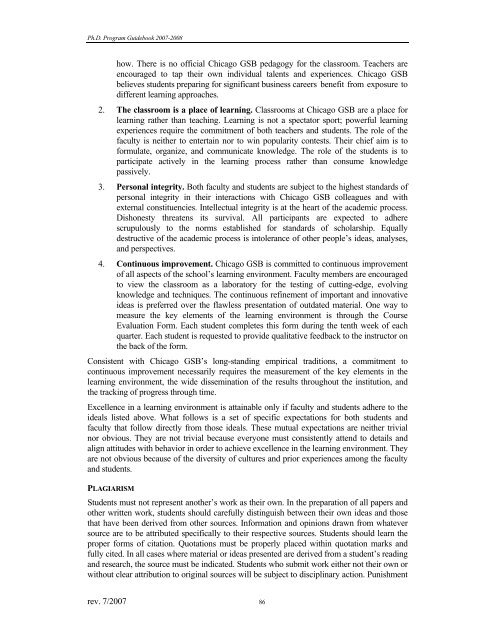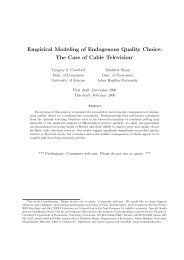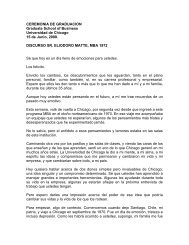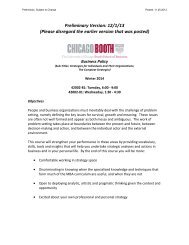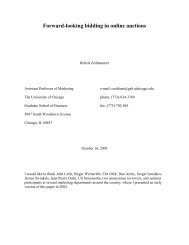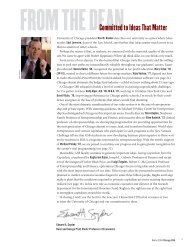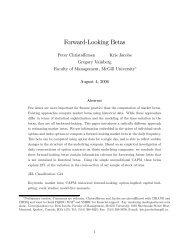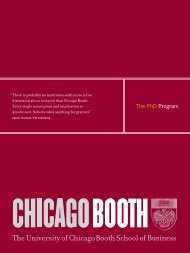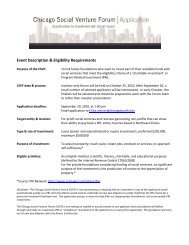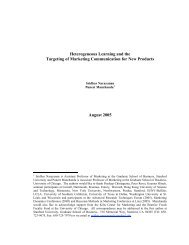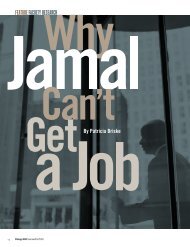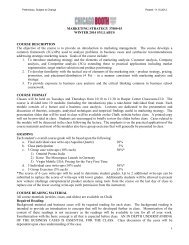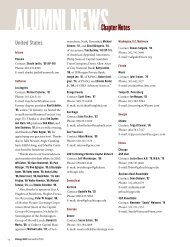Ph.D. Program Guidebook - The University of Chicago Booth School ...
Ph.D. Program Guidebook - The University of Chicago Booth School ...
Ph.D. Program Guidebook - The University of Chicago Booth School ...
You also want an ePaper? Increase the reach of your titles
YUMPU automatically turns print PDFs into web optimized ePapers that Google loves.
<strong>Ph</strong>.D. <strong>Program</strong> <strong>Guidebook</strong> 2007-2008<br />
how. <strong>The</strong>re is no <strong>of</strong>ficial <strong>Chicago</strong> GSB pedagogy for the classroom. Teachers are<br />
encouraged to tap their own individual talents and experiences. <strong>Chicago</strong> GSB<br />
believes students preparing for significant business careers benefit from exposure to<br />
different learning approaches.<br />
2. <strong>The</strong> classroom is a place <strong>of</strong> learning. Classrooms at <strong>Chicago</strong> GSB are a place for<br />
learning rather than teaching. Learning is not a spectator sport; powerful learning<br />
experiences require the commitment <strong>of</strong> both teachers and students. <strong>The</strong> role <strong>of</strong> the<br />
faculty is neither to entertain nor to win popularity contests. <strong>The</strong>ir chief aim is to<br />
formulate, organize, and communicate knowledge. <strong>The</strong> role <strong>of</strong> the students is to<br />
participate actively in the learning process rather than consume knowledge<br />
passively.<br />
3. Personal integrity. Both faculty and students are subject to the highest standards <strong>of</strong><br />
personal integrity in their interactions with <strong>Chicago</strong> GSB colleagues and with<br />
external constituencies. Intellectual integrity is at the heart <strong>of</strong> the academic process.<br />
Dishonesty threatens its survival. All participants are expected to adhere<br />
scrupulously to the norms established for standards <strong>of</strong> scholarship. Equally<br />
destructive <strong>of</strong> the academic process is intolerance <strong>of</strong> other people’s ideas, analyses,<br />
and perspectives.<br />
4. Continuous improvement. <strong>Chicago</strong> GSB is committed to continuous improvement<br />
<strong>of</strong> all aspects <strong>of</strong> the school’s learning environment. Faculty members are encouraged<br />
to view the classroom as a laboratory for the testing <strong>of</strong> cutting-edge, evolving<br />
knowledge and techniques. <strong>The</strong> continuous refinement <strong>of</strong> important and innovative<br />
ideas is preferred over the flawless presentation <strong>of</strong> outdated material. One way to<br />
measure the key elements <strong>of</strong> the learning environment is through the Course<br />
Evaluation Form. Each student completes this form during the tenth week <strong>of</strong> each<br />
quarter. Each student is requested to provide qualitative feedback to the instructor on<br />
the back <strong>of</strong> the form.<br />
Consistent with <strong>Chicago</strong> GSB’s long-standing empirical traditions, a commitment to<br />
continuous improvement necessarily requires the measurement <strong>of</strong> the key elements in the<br />
learning environment, the wide dissemination <strong>of</strong> the results throughout the institution, and<br />
the tracking <strong>of</strong> progress through time.<br />
Excellence in a learning environment is attainable only if faculty and students adhere to the<br />
ideals listed above. What follows is a set <strong>of</strong> specific expectations for both students and<br />
faculty that follow directly from those ideals. <strong>The</strong>se mutual expectations are neither trivial<br />
nor obvious. <strong>The</strong>y are not trivial because everyone must consistently attend to details and<br />
align attitudes with behavior in order to achieve excellence in the learning environment. <strong>The</strong>y<br />
are not obvious because <strong>of</strong> the diversity <strong>of</strong> cultures and prior experiences among the faculty<br />
and students.<br />
PLAGIARISM<br />
Students must not represent another’s work as their own. In the preparation <strong>of</strong> all papers and<br />
other written work, students should carefully distinguish between their own ideas and those<br />
that have been derived from other sources. Information and opinions drawn from whatever<br />
source are to be attributed specifically to their respective sources. Students should learn the<br />
proper forms <strong>of</strong> citation. Quotations must be properly placed within quotation marks and<br />
fully cited. In all cases where material or ideas presented are derived from a student’s reading<br />
and research, the source must be indicated. Students who submit work either not their own or<br />
without clear attribution to original sources will be subject to disciplinary action. Punishment<br />
rev. 7/2007 86


